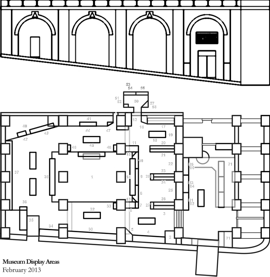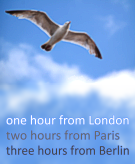Peace Statue ("The Brighton Angel"): Difference between revisions
No edit summary |
(+photo) |
||
| Line 1: | Line 1: | ||
{{Box|Brighton_Angel_of_Peace_statue_at_sunset.jpg|The Angel at sunset|380}} | |||
The '''Peace Statue''', known locally as just '''The Angel''' stands on the Brighton-Hove boundary, and was commissioned to commemorate the reign of '''Edward VII (1841-1910)''', who had just died. The statue was designed in the shape of an angel as a reference to Edward's nickname, "The Peacemaker". | The '''Peace Statue''', known locally as just '''The Angel''' stands on the Brighton-Hove boundary, and was commissioned to commemorate the reign of '''Edward VII (1841-1910)''', who had just died. The statue was designed in the shape of an angel as a reference to Edward's nickname, "The Peacemaker". | ||
Before its unveiling in 1912, a temporary wooden version stood on the site for perhaps a year. | Before its unveiling in 1912, a temporary wooden version stood on the site for perhaps a year. | ||
Revision as of 19:28, 7 October 2016
The Angel at sunset [image info]
The Peace Statue, known locally as just The Angel stands on the Brighton-Hove boundary, and was commissioned to commemorate the reign of Edward VII (1841-1910), who had just died. The statue was designed in the shape of an angel as a reference to Edward's nickname, "The Peacemaker". Before its unveiling in 1912, a temporary wooden version stood on the site for perhaps a year.
The statue carries the coats of arms of both Brighton and Hove, but maintenance was Hove’s responsibility.
Newbury Abbott Trent
The "Angel" was sculpted by Newbury Abbott Trent (1885 –1953), a sculptor trained at the Royal College of Art and Royal Academy, who specialised in war memorials, and who produced a small number of quite similar-looking "Angel" memorials.
Orientation
According to local legend, the statue was originally intended to be positioned so that the angel would be facing the sea, and would be the face of Brighton seen by passing vessels.
However, the angel's final position had it facing away from the sea and towards the town, perhaps because the townpeople wanted to see the statue’s face themselves.



